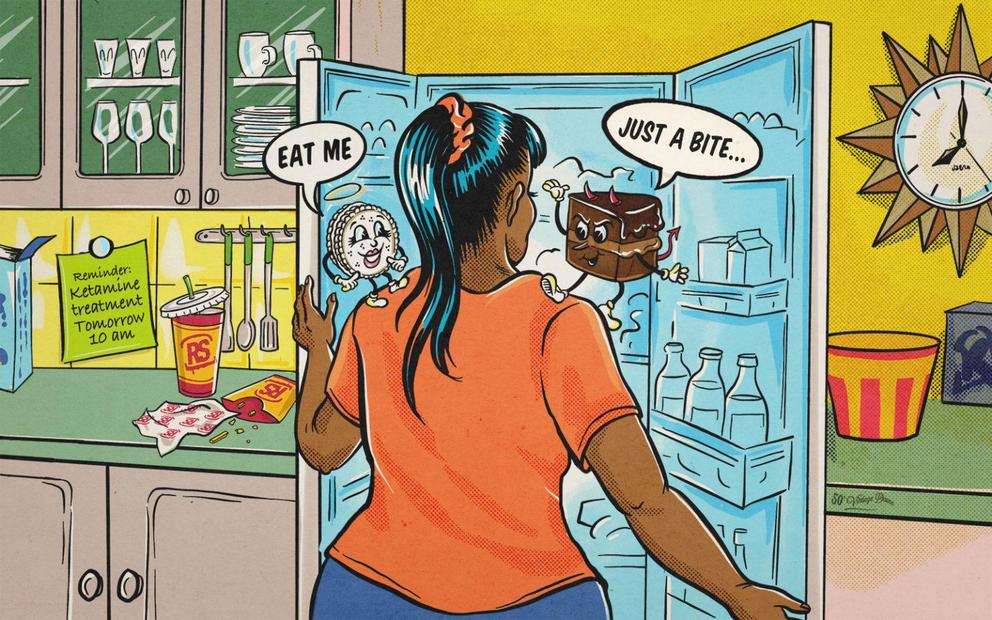Ketamine treatment for eating disorders
Although originally intended as a surgical anesthetic, ketamine now provides fresh hope for patients suffering from depression, chronic pain, PTSD and a range of other ailments. Today, some are wondering if a ketamine treatment for eating disorders is the best new path towards their healing. Before getting into the details, let’s go over a few ketamine basics first.
What Is Ketamine?
Calvin Lee Stevens, an American chemist, first synthesized ketamine in 1962 as an anesthetic alternative to PCP. After testing the effects on animals and gaining approval from the FDA in 1970, ketamine became the go-to battlefield surgical anesthetic in the Vietnam War for its fast-acting sedative effects.
Ketamine is an NMDA receptor antagonist, meaning it disrupts the typical flow of information in the brain and spinal cord by blocking neurotransmitters such as glutamate from binding to NMDA receptors. At high doses, drugs classified as NMDA antagonists, like ketamine or PCP, disrupt communication in the brain to such a degree that they induce a state of dissociative anesthesia.
Ketamine comes in a few different forms: injectable liquid, crystalline powder and a prescribed medicinal nasal spray. Those using ketamine recreationally most commonly consume the powder form intranasally-many of which buy ketamine online. In legal settings, medical professionals and researchers administer liquid ketamine intravenously through muscle injections or IV infusions. This ensures the efficacy of studies and treatments as injection guarantees the correct and full dosage gets to the brain.
Ketamine as a Treatment
Even before the COVID-19 pandemic, the numbers of adults and youth reporting symptoms of mental illness were steadily rising. Traditional treatments, like antidepressants, work to increase levels of serotonin and dopamine over time. While this works for some, about one-third of patients don’t respond to SSRI treatments. With more people than ever seeking relief and healing, mental health professionals are looking for cutting-edge treatments, especially for those experiencing treatment-resistant illness: enter ketamine treatments.
Mental illnesses like chronic depression or anxiety disrupt neural connections in the brain, presenting as changes in motivation, mood and cognition. Over time, consistent disruption of those neural pathways causes the synapses to atrophy. When ketamine is introduced to the brain, it blocks the NMDA receptors, creating a surge of glutamate. This surge causes a subsequent increase of neurotrophins involved in neural growth, allowing for lost neural connections to be re-established.
There are two main types of ketamine treatments: ketamine infusions and ketamine assisted psychotherapy.
Ketamine infusions are performed at ketamine clinics where patients act as passive participants as ketamine is administered intravenously. This form of ketamine treatment does not require a licensed psychotherapist to be present and can be administered by a nurse practitioner or clinician. There is no talk therapy component to ketamine infusions. The goal is antidepressant benefits and the emphasis is on the biochemical response to ketamine rather than the dissociative experience ketamine can produce.
Ketamine assisted psychotherapy requires a licensed psychotherapist to lead patients through discussions and aims to address the root causes of their mental illness while still utilizing ketamine’s biochemical effect on the brain. Some ketamine assisted psychotherapy adjusts the ketamine dosage enough that it induces a psychedelic state. Here, while dissociated from their usual sense of self, patients can work through trauma without the hindrance of their normal neural signaling.
For the rest of this article please go to source link below.

